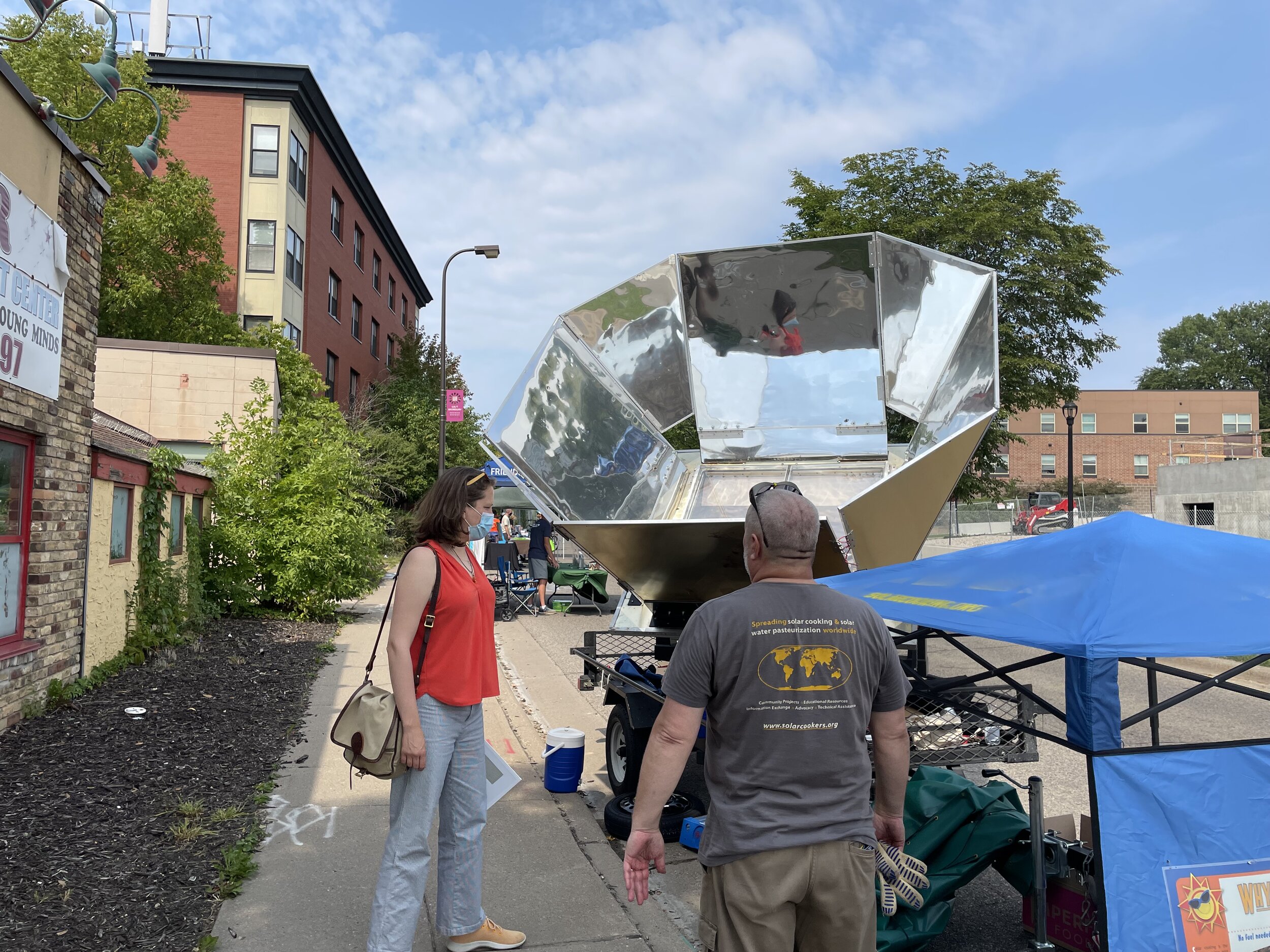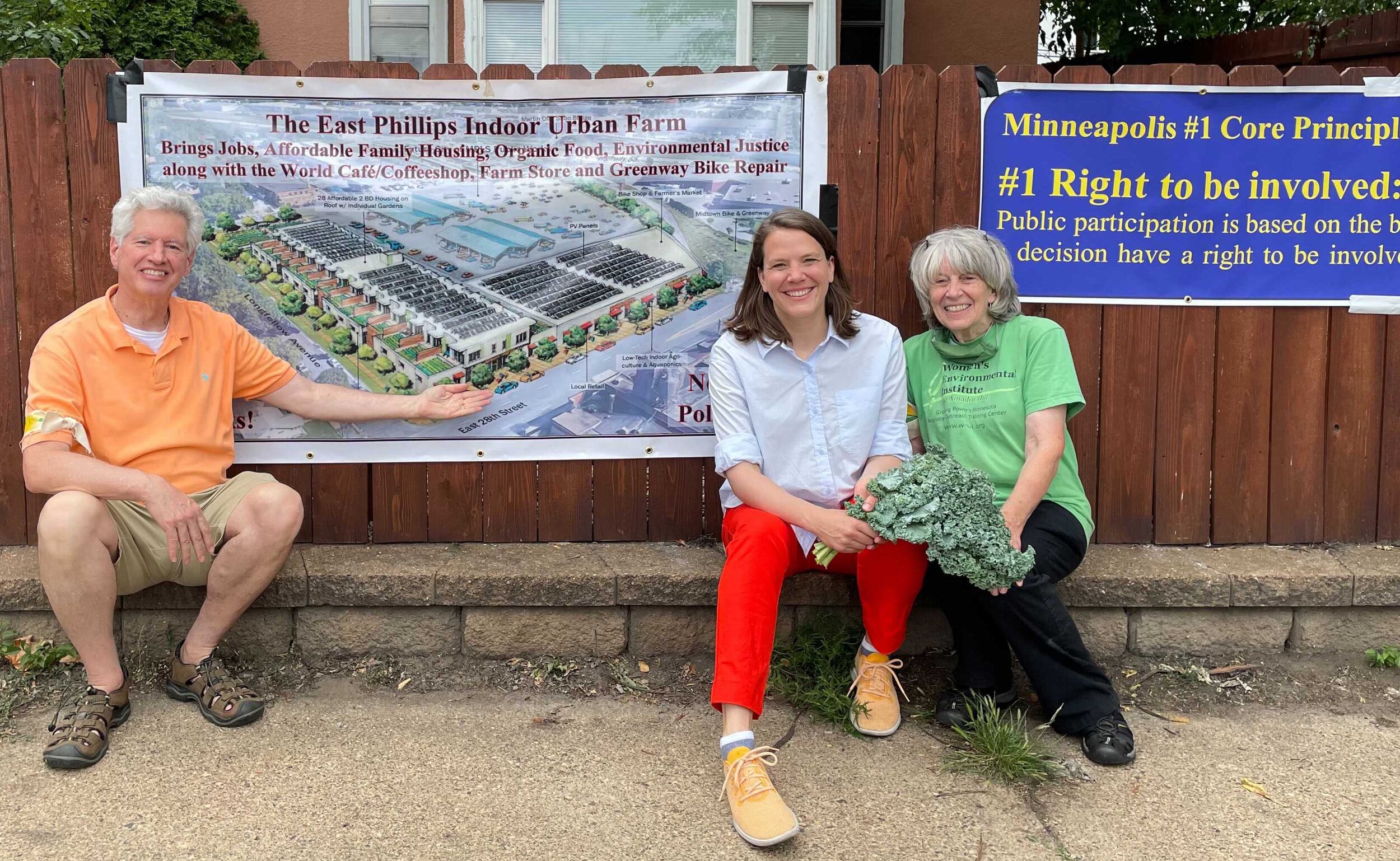
Minneapolis Green New Deal
What is the Minneapolis Green New Deal?
The Minneapolis Green New Deal (GND) is a bold plan to put Minneapolis on the path toward being a healthy, just, resilient city grounded in a vibrant democracy and abundant opportunity. We need a Minneapolis GND now because our health, our homes, and our pocketbooks are already taking the hit from a dirty energy system that has led to the ongoing climate emergency. Addressing this complex crisis will mean transforming our city together.
Together, we will make our homes and businesses more affordable, healthy, and resilient. We will build environmental justice so every kid in our city grows up in a healthy home and neighborhood with clean air and water. We will rebuild our local economy with new jobs and shared ownership models so every person in Minneapolis finds an opportunity in our clean, green economy. We will strengthen local democracy and community leadership as the foundation of navigating the climate change era together.
As a City, we will move courageously on climate action in Minneapolis creating health, wealth, and community benefits in our city. Minneapolis will be at the forefront of addressing a global challenge with bold local leadership.
Goals of the Green New Deal
Minneapolis reduces greenhouse gas emissions by at least 40% by 2025, 60% by 2030, and 100% by 2045 based on a 2006 baseline. These are ambitious goals based on climate science and Minneapolis’ responsibility to use our wealth and resources to lead on climate.
Every Minneapolis resident feels like they are a part of determining the future of our city and able to take climate action in their lives and community.
Minneapolis is making meaningful, measurable progress toward
Every resident having a stable, affordable, and healthy home in a
safe, climate-resilient neighborhood
with healthy air, soil, water, and food
Connected by transportation options and energy sources that reduce fossil fuel use, promote active transportation lifestyles, and build community wealth
Strategies of the Green New Deal
The Minneapolis GND will build a healthier, more climate-resilient Minneapolis using the following six strategies:
Jumpstart Minneapolis Climate Action in 2022.
Integrate environmental justice and equitable economic opportunity into city climate action.
Make Minneapolis a global leader on addressing fossil gas emissions in a northern city.
Make transportation safe, affordable, accessible, and carbon-free.
Build city, community, and family resilience in the face of a changing climate.
Strengthen our multiracial democracy to make sure we are capable of navigating the climate change era.
Jumpstart Minneapolis climate action in 2022
Minneapolis has taken strong climate action. However, city climate action is not up to the scale of the challenge. We are well beyond climate action being done on a project-by-project or program-by-program basis. We need a city-wide mobilization to meet the scale, urgency, and opportunity of the climate crisis. The first year of a Knuth mayoral administration will include the following actions to ramp up climate action in Minneapolis.
Update City Climate Action Plan in 2022 – integrating more ambitious emissions reduction, environmental justice, equitable economic opportunity, and climate resilience and adaptation. Minneapolis has not updated its climate action plan, despite a requirement to do so in the 2040 Plan.
Appoint a Green New Deal advisor in the Mayor’s Office to lead and coordinate the Minneapolis Green New Deal efforts and work across departments and sectors to catalyze action.
Appoint a Climate Justice and Resilience task force to inform and promote the new climate action plan. Ensure this taskforce is working in collaboration with relevant city commissions, including the Clean Energy Partnership.
Have each department in the city enterprise designate a climate justice point person and a technical climate advisor who, working together, will coordinate actions with city sustainability and resilience staff and the Mayor’s Green New Deal advisor
Include climate action and justice as part of neighborhood engagement work, including the annual conference with associations
Conduct a climate audit of every part of the city budget and identify opportunities to lessen city impacts on the climate and better prepare Minneapolis for the climate impacts underway.
More effectively implement the Minneapolis zero-waste Plan completed in 2017, an essential part of transitioning away from the use of the Hennepin Energy Recovery Center (HERC)
Hold a Minneapolis climate summit in the second half of 2022 in partnership with local universities, NGOs, businesses, schools, Labor unions, governments, and neighborhood associations to get buy-in on the Minneapolis Climate Action Plan and leverage climate action across Minneapolis.
Integrate environmental justice and equitable economic opportunity into city climate action
Ensuring everyone in Minneapolis can thrive through the climate change era means we need to build safe, healthy neighbors with economic opportunities. In other words, environmental justice and equitable economic opportunity are a foundation of the Minneapolis Green New Deal.
Environmental justice and climate justice
Within three months, evaluate implementation of the North and South Side Green Zone plans and identify how to make implementation more effective – including funding and staffing needs, community engagement work, and whether/how to move this work into ordinance
Make plan for how to target city investment and advocacy to reduce traffic congestion and pollution in most polluted neighborhoods
Make addressing vulnerabilities identified in city Green Zones a top-priority in climate adaptation and resilience strategy
Identify the top 5 largest point sources for particulate matter pollution in the Green Zones; make and implement plans to reduce and/or eliminate these sources of pollution.
Put a state cumulative impacts policy on the City’s priority list of legislative actions
Pause the expansion of the City’s Hiawatha Maintenance Facility in East Phillips and partner with Green Zones communities to deepen and realize their environmental justice vision.
Build equitable economic opportunity through climate and clean energy jobs and ownership
Promote inclusive financing for energy conservation and efficiency to enable more Minneapolis residents to take advantage of incentives for energy improvements in their homes, make sure this work is well-integrated into city-wide energy conservation, efficiency, and electrification program described in section 3 below.
Leverage federal American Rescue Plan dollars to make progress on a climate and clean energy job training program and to support job creation
Partner with city businesses, universities, unions, apprenticeship programs, and internship programs to create pathways into good-paying energy efficiency, clean energy, and climate jobs
Create a climate-focused component of the Step Up youth jobs program
Increase Green-Business cost-share program to at least $5 million annually, targeting clean energy and climate businesses owned and/or operated by Black, Indigenous, immigrant, Asian, and brown residents
Make Minneapolis a global leader in addressing emissions from fossil gas in a northern city
Emissions from fossil gas (also known as natural gas) are the largest source of greenhouse gas emissions in Minneapolis. To meet our city’s pollution reduction goals, we need to take on this source of emissions. Right now homeowners, renters, and business owners have to figure out home energy efficiency and electrification individually. It is too hard for people and too slow for climate action to approach the challenge as individuals. A Minneapolis Green New Deal will use the power of the Mayor’s office to convene, coordinate, and mobilize technical and financial resources to go block by block and neighborhood by neighborhood to weatherize, insulate, and electrify homes and businesses across the city as fast as necessary.
Mobilize around safe, healthy, energy efficient homes powered by electricity
Design and ramp up program for weatherizing, insulating, and electrifying homes across Minneapolis. The program will start with neighbors who have larger energy cost-burdens and then grow to cover the whole city. The Minneapolis Green New Deal adviser will design and resource this program in collaboration with community-based and culturally-based organizations, the University of Minnesota, job-training programs, energy non-profits, utilities, property managers, and philanthropy.
Pass a public housing levy to maintain and build more public housing options, and make this housing as energy efficient as possible.
Pass a public housing levy to maintain and build more public housing options, and make this housing as energy efficient as possible.
Evaluate city lead remediation programs and adjust them to make sure they work effectively with home energy retrofit programs to serve multiple benefits.
Move forward on inclusive financing of energy conservation and clean energy so more people gain the economic and health benefits associated with this work.
Ensure the success of inclusive financing by collaborating with trusted community groups to promote and get people involved in energy conservation, with a particular focus on renters and historically underinvested in neighborhoods.
Educate residents about how to use energy disclosure and that city utilities provide the data needed to comply with disclosure. understand and know how to use energy disclosure information and that Xcel (and Centerpoint) provides the data needed for people to comply.
Work with the city council to require developers to report how new construction projects deliver on city climate goals as is currently required in the 2040 Plan but is not yet being implemented.
Ensure city-financed development projects achieve health and resilience metrics aligned with Minneapolis’s Climate Action Plan as required by the 2040 Plan.
Rapidly reduce fossil gas use in commercial and industrial property
Identify and move on three district energy systems, starting with the Towerside Innovation District
Target increased green business cost-share program investments at getting natural gas out of commercial, industrial and multifamily buildings
Use hook-up fees to disincentivize natural gas hook-ups for new developments and require, when possible, rooftop solar installation and ground-source or air-source heat pumps for heating and cooling.
Work with local green business incubators to realize the economic opportunity of energy conservation, efficiency, and electrification in our local economy and as a global leader on addressing climate change in Northern climates
Build trust in district heating/cooling and heat pump technology as effective and usable in our northern climate by partnering with the University of Minnesota and community/business groups to hear concerns and communicate solutions.
Make transportation safe, accessible, and carbon-free
Transportation is the biggest source of emissions in the state of Minnesota overall. As the state’s biggest city, Minneapolis has a unique role in leading the way on increasing transportation options, making it easier to not drive, and electrifying transportation.
Revise vehicle miles traveled reduction targets to align with updated emissions targets. Align these targets with other jurisdiction’s targets (Hennepin County, MnDOT, nearby cities) if those targets are sufficiently strong to meet emissions targetsl on VMT reductions.
Go all-in on 2040 Plan and Transportation Action Plan implementation with climate justice and mobility for a growing city as central goals; update Transportation Action Plan metrics to align with updated emissions targets if necessary
Work with regional and state partners to build out a fast, easy-to-use bus-rapid transit system, moving first on electrifying this system in communities overburdened by pollution
Use tools at the city’s disposal to improve and expand transit service, including dedicating street space to bus lanes and providing stoplight priority to transit vehicles as a way to meet climate and equitable economic opportunity goals
Use pilots and temporary interventions for transit, bike, and people-centered infrastructure in order to facilitate roll out on a system-wide basis. Community members can test pilots as an engagement tool, and community members and Public Works staff can experience and test the benefits of full transportation networks rather than smaller, less effective transit line investments.
Work on preventing new lanes on highways or roadways within city boundaries as part of freeway rebuilding projects
Create a small business and storefront revitalization program funded by local parking revenues to support small business visibility and enhance the pedestrian experience in neighborhood nodes and commercial centers
Actively disincentivize construction of new parking, and redirect some of the $100M+ per year currently spent on parking construction toward community development, affordable housing, and sustainable transportation initiatives
Create equitable incentives for purchase and use of electric vehicles and electric bikes
Ensure the city has the electric-vehicle charging infrastructure needed to make the use of this technology easy and affordable.
Electrify the city fleet and work with the Metropolitan Council on electrifying transit, prioritizing neighborhoods that are overburdened by higher pollution levels.
Build city, community, and family resilience in the face of a changing climate
From parents debating whether or not to let their children play outside on bad air quality days to homeowners figuring out how to clean up wet basements, Minneapolis residents are already feeling the impacts of climate change. Minneapolis does not yet have a climate resilience strategy. The Minneapolis Green New Deal takes climate impacts already underway seriously. And it builds a path forward to navigate these changes with resilience and strength from families to our community overall.
Create a Minneapolis climate adaptation and resilience strategy as part of the City’s updated climate action plan
Complete a citywide climate vulnerability assessment
Audit all city capital investment processes to make sure they include climate change resilience as part of prioritization, design, and operation of the investments.
Implement policies to ensure city capital investment analyses take long-term operational costs associated with the capital investment into account, including energy efficiency gains and the cost of externalities in the analyses
Include short-, medium-, and long-term projections for climate migration and options for how to include climate migration to Minneapolis and Minnesota in city planning.
Convene a health care provider group to assess resilience of community and public health systems to threats of climate change and include recommendations for improvement in public health aspects of the city’s climate resilience strategy
Make climate change and climate resilience a key focus in the development of the city’s all-hazards plan, partnering with the state Homeland Security and Emergency Management Division in doing so.
Work with the Minneapolis Park and Recreation Board to establish and grow a city tree canopy plan to mitigate urban heat island impacts, provide neighborhood greening, and facilitate biodiversity
Strengthen family and community resilience
Strengthen the care economy in Minneapolis, including making accessible, quality childcare and eldercare the norm across the city
Update the Minneapolis food plan, including climate resilience as part of the plan
Invest in community resilience hubs, starting in the North and Southside Green Zones, as places for facilitating community connection and offering power, cooling, heat, food, and health care as necessary in the face of climate disasters.
Develop community climate resilience communication tools so residents are able to make good health and wellbeing decisions in the face of climate impacts. For example, add an air quality alert system to Minneapolis public communication with suggestions for how to monitor air quality and steps to take to protect health.
Build family and community wealth as a foundation of resilience
Build community ownership of clean energy assets and green enterprises as a foundation for generational wealth-building and economic resilience. Examples of ways to do so include community ownership of solar and wind, housing co-ops/ tenant-controlled housing that is energy efficient and healthy, worker co-op/worker controlled ownership of clean energy businesses, and community-owned district heating
Pilot and grow universal basic income programs in the city in order to facilitate family resilience to all kinds of emergencies, including climate-change-driven emergencies
Create a program to open a college-saving account for every child born in the city and invest at least $50 in each account. This program will use Saint Paul’s CollegeBound program as a model
Strengthen our multiracial democracy to make sure we are capable of navigating the climate change era
As climate change continues to increase stress on our infrastructure, social, and governance systems, the Minneapolis Green New Deal will intentionally reweave and strengthen our city’s multiracial democracy. Strengthening democracy helps to make sure we include multiple perspectives, prioritize the health and wellbeing of people, and lean into the work of creating our shared future together.
Intentionally reinvigorate engagement of relevant community advisory groups and collaborations as part of the Minneapolis Green New Deal including the Clean Energy Partnership, Energy Vision Advisory Committee, Bicycle Advisory Committee, the Capital Long-range Improvements Committee, Community Environmental Advisory Commission, Homegrown Minneapolis Food Council, Minneapolis Advisory Committee on Housing, Minneapolis Advisory Committee on People with Disabilities, Minneapolis Public Housing Authority, Minneapolis Workforce Development Board, Northside Green Zone Task Force, Southside Green Zone Task Force, Mississippi Watershed Management Organization, Pedestrian Advisory Committee, Public Health Advisory Committee, Racial Equity Community Advisory Committee, Violence Prevention Steering Committee, and any other relevant commission or committee
Provide strong mayoral leadership on the Clean Energy Partnership, making sure this unique city/utility collaboration is grounded in our community and meeting its potential for strong progress on clean energy action
Fund community investment initiatives--such as transportation infrastructure investments or public realm investments--to include sufficient funds for anti-displacement measures
Create a Labor advisory council to ensure worker and community rights are part of the Minneapolis GND
Continue to invest in voter outreach and access at the city level, including partnering with community groups that engage different cultural groups in voting
Include explicit strategies and tactics for strengthening democracy as part of the city’s climate action plan update
Require rigorous anti-racist training starting with city staff and moving to committees, contractors, and collaborators
Push forward and strongly support existing city efforts on a truth and reconciliation process in Minneapolis
Engage with community and research organizations to explore suite of reparations options, including but not limited to direct payments, pathways to home ownership, and community investments
Engage/partner with Indigenous leaders and follow their lead to create city structures/positions to tribal representation and power as part of city government
Engage with and support neighborhood associations to diversify who is involved with and represented in these organizations
Provide tools for neighborhood associations and other groups to take climate action in their communities.
Hold a summit on Multiracial Democracy and Climate Change in 2023 to focus effort and enlist community partners in this work










